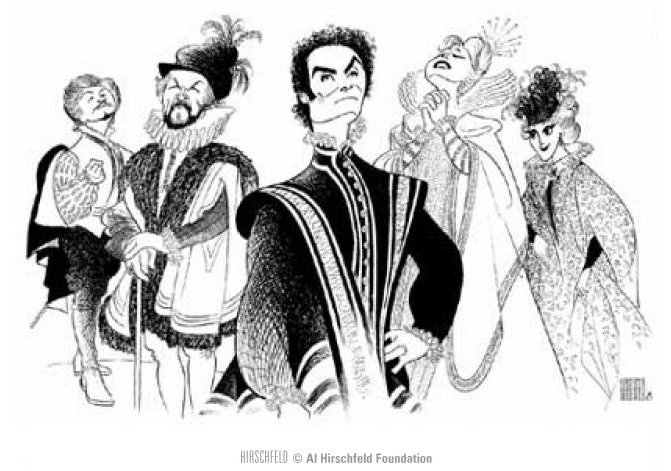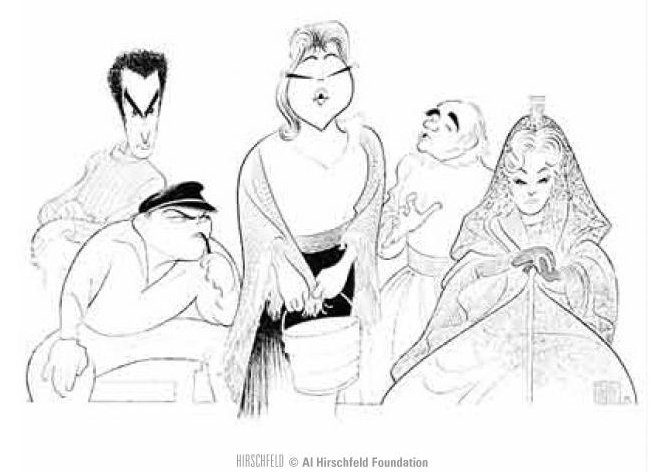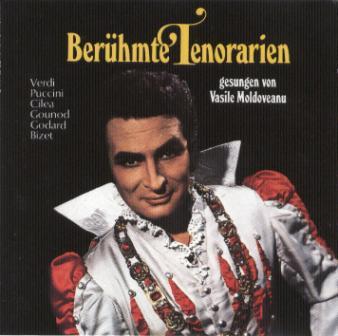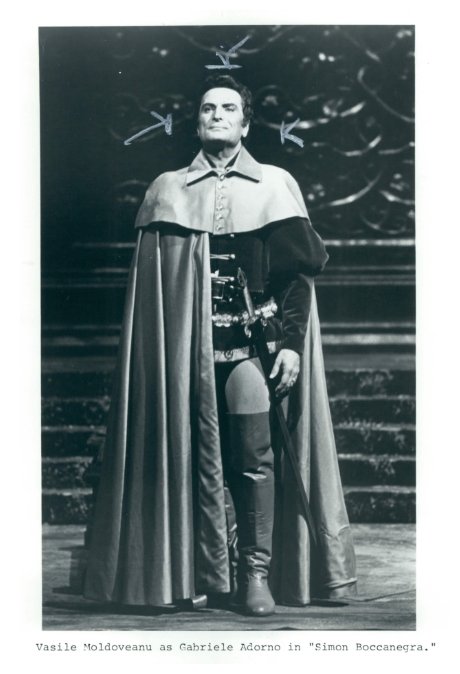CONVERSATION PIECE:
TENOR VASILE MOLDOVEANU
By Bruce Duffie
Even if you don’t recognize the name at first,
you’ve probably seen tenor Vasile Moldoveanu on the television – as Don
Carlo in the “Live from the Met” series, as well as other parts. [Center in Hirschfeld caricature below]

Born in Romania, he sang for seven years at the
National Opera in Bucharest, but is now based in Monte Carlo.
Engagements take him all over the world, including to Chicago, where I
met him between performances. He’d not been originally scheduled,
but when Luciano Pavarotti canceled Luisa
Miller, the tenor scheduled
for Madama Butterfly
(Giuliano Ciannella) happened to know this
particular Verdi role, and it was easier for management to find another
tenor who knew the Puccini opera.
It was an unexpected pleasure to meet Mr.
Moldoveanu, and I began by asking him about combining singing with
traveling…
Vasile Moldoveanu:
I have to be very sincere and say that it’s a
very tiring life, especially in situations like this where I was back
home for a couple of days and then got the call to substitute in
Chicago. You cannot just jump into doing a role. Thank
goodness I had just finished a Puccini role (Cavaradossi) before having
to come here for Butterfly.
They are in the same vocal
category. Then from here I do Bohème
at the Met, so again
it’s the same kind role. You
cannot jump from one style to another right away. That is not
good for the voice. If I had to do a Verdi role next, I would
want at least a week to change the voice and be prepared vocally.
Even though you know a role, you need time to get the voice used to it
again.
Bruce Duffie: Do
you find yourself singing too much?
VM: I am not one
of those tenors who does that. I say “no”
a lot of times, but it is very difficult, especially when it’s a new
theater because they might not ask you a second time.
BD: How does the
size of the different theaters affect your vocal
production?
VM: This is an
issue which is talked about very much. We
tend to sing the same way most of the time, but in the very large
houses – like the Met, Chicago, San Francisco,
La Scala – one tends to
give a little bit more. When I’ve been on tour with the Met, I’ve
sung in very large places – such as Boston or Cleveland where we use
microphones because they are so enormous. We’re talking
capacities of 14,000 people!
BD: From a
strictly artistic point of view, how are the voices in
Bucharest?
VM: The voices are
very beautiful. The maestri
and the musicians were raised in the strict Italian tradition.
It’s been 12 years since I left Romania so I’m not up on current
trends, but the life is very hard there. Everyone is paid so
little and life is so difficult that
there is little one can say. In my particular case, it was
especially hard because I often couldn’t get visas to honor contracts
in the West. And because I wasn’t part of the political majority,
I wasn’t given very much to sing in Romania. I’m trying to forget
about that part of my life. The best luck I had was to leave
there and come here.
BD: You gained
national fame by singing Verdi’s Don Carlo.
Tell me a bit about that role.
VM: I would like
to retire Don Carlo, but I can’t because people
keep asking me for it. It’s a very big part, especially since I
always do the five-act version. It’s a hard part to sing, and he
doesn’t get a big aria like the other characters do. It’s a most
beautiful opera and I like it very much, but I did 43 performances in
three years, so I think I’ve done it enough. It is very
long; even in Germany where the
people are used to the long Wagner operas, people tend to go away
before the last duet. Perhaps it could be done over two evenings,
or, as I prefer, make some cuts.
BD: Do you believe
in cuts in general?
VM: This is a very
thorny question. I have done operas with
cuts for which there was no justification, and others where the cuts
were quite acceptable. I remember one performance where the
number of cuts wasn’t bad, but their placement was weird. To
re-open cuts can become a long and laborious procedure, and the
orchestra often will protest.
BD: You’ve done Don Carlo on the television.
Do you feel the
opera works well on the tube?
VM: I’ve heard
that everyone was very happy about the Don Carlo
and said it was one of the best TV broadcasts they had. Some even
said the set and production looked better on the TV than it did in the
theater. The same things were also said about the Tabarro I was
in. [Left in Hirschfeld
caricature below] Not everything works well on the
television; however,
it’s important from the point of view of gaining audiences and showing
opera to people. Nothing beats it for publicity. I’ve been
singing for twenty years and no one ever knew me. Now after
these two TV things, everyone recognizes me.

BD: Do you work
harder when you know it’s being broadcast?
VM: When you’re on
TV, it’s important that very good singers also
be very good actors, and that is a difficult thing to find. If
it’s not being relayed live, you can do one “take” and then another, so
it’s not as hard on you. But if the broadcast is going out as
you’re doing it, the concentration has to be immense, and you have to
work a lot ahead of time. We
had very long and extensive musical rehearsals before going on TV.
BD: Can a
production get over-rehearsed?
VM: These days it
is hard to rehearse too much. There most
you get is two or three weeks for a new production, which is just
enough. I saw many of the Felsenstein productions which were
beautifully rehearsed, but there was too much emphasis on the acting
all the time. The singing suffered because they were so exhausted
after the long rehearsal period that they had no voice left over for
the performances! He demanded that they sing out full-voice all
the time. He didn’t let them “mark” at all. In my opinion,
some voices were destroyed in the process of working with him.
BD: Going back to
the idea of filming over several days – does
this not become a fraud?
 VM: It is a fraud in a
sense because they modify things that
are bad so they become good. I can remember specific instances
where things went pretty badly, but after the editing, the end result
was really quite nice. The problem is compounded in audio
recordings because they can repeat a note twenty or thirty times until
it comes out just right, but the public is getting a different product
than it originally was. In the old recordings, one could hear
where a change was made, but now the technique is so perfect that they
can do anything they want and change everything. I myself buy
very few opera recordings unless they were done in performance.
VM: It is a fraud in a
sense because they modify things that
are bad so they become good. I can remember specific instances
where things went pretty badly, but after the editing, the end result
was really quite nice. The problem is compounded in audio
recordings because they can repeat a note twenty or thirty times until
it comes out just right, but the public is getting a different product
than it originally was. In the old recordings, one could hear
where a change was made, but now the technique is so perfect that they
can do anything they want and change everything. I myself buy
very few opera recordings unless they were done in performance.
BD: Are the
critics – and the public – expecting too much when they
go to the theater?
VM: Perhaps it’s
the fault of the recordings that the public
comes and expects to hear the same perfection they experience at
home. The human voice doesn’t work that way. On the other
hand, the public in the large theaters in the big cities is always
wonderful. Recordings are so cold, but in the live performance
it’s whatever happens.
BD: Are you glad
that some of your performances are preserved via
broadcasts?
VM: Oh sure, just
as I’m glad to have tapes of performances by
Bjoerling and Tucker and the other great tenors.
BD: Do you like
being a Verdi tenor?
VM: I also sing a
lot of Puccini, and the roles that have been
most successful for me and that I like the best are Des Grieux in Manon
Lescaut and Cavaradossi in Tosca.
But I am glad to be both a
Puccini tenor and a Verdi tenor because they both wrote so
wonderfully. Sometimes, it is hard to sing some of what Verdi
wrote, but on the whole his operas are great for the voice.
Puccini also knew the voice very
well, but his orchestration is so loud and so big that it is hard to go
over it. I would never advise a young tenor to start with a
Puccini role. Even the role in Butterfly,
which is essentially
just the one act, has to fight the orchestra which is very loud when
the tenor is singing. You really have to work very hard.
There is a fashion today to start tenors with Bohème, and that
is a very hard role. It is really a spinto role, and I feel one
should have a certain vocal maturity to approach Puccini.
BD: OK, where
should a young tenor start?
VM: I can only
speak from my own experience, and I began with
Belmonte and Don Ottavio. I always had a big voice, and soon did
Traviata. I never had a
light “tenorino” sound. I did some
performances of Don Pasquale
and Elisir d’Amore, but the
only Donizetti
I still sing is Lucia.
BD: Is there a
competition amongst tenors?
VM: I always read
about it in the press, but there are so few
tenors that there is room for everyone to make a good living.
BD: Does that mean
there is too much opera being given?
VM: That
depends. It Germany, the theaters which do only
modern things don’t have any public any more, whereas there are
places that only do conservative repertoire, and that is not right,
either. Theaters should mix things up like they do elsewhere.
 BD: Do you have any
advice for the composers writing operas today?
BD: Do you have any
advice for the composers writing operas today?
VM: I think the
biggest problem is that they don’t have any
regard for the human voice.
BD: What’s the
role of the critic?
VM: I have many
years to sing yet, so I have nothing to say about
them! Everyone can welcome and appreciate criticism of a
constructive kind. One doesn’t always need praise, but the
critics should be a bit more fair than they are. The notion that
they have to say something bad about everyone is getting out of hand.
BD: Do the prose
writings and letters of composers have an
influence on your performances?
VM: Yes, very
much. Sometimes, a conductor will point out
something which the composer wrote, and that will have any impact on
how I do the role. It can be very useful.
BD: Tell me about
your current role – Pinkerton.
VM: People tend to
complicate Pinkerton’s character way too
much. He was very young and he loved women, but he did have heart
and sensitivity. He liked Butterfly a lot and wanted her, and did
what was expected at the time.
BD: Many of your
characters wind up dead. Do you enjoy
getting killed onstage?
VM: To play it
onstage, I don’t mind it. Sometimes it doesn’t go quite
right. I remember the Ballo
in San Francisco, and at the end
the baritone couldn’t get the gun to fire. After a while, I
simply fell down because I couldn’t wait any longer to die! Most
of the characters I play are positive ones. My tendency is to
sweeten them all because that is my nature, but I have to control the
natural desire to make everyone sweet and good. From a dramatic
point of view I could do so many things, but the voice just will not
sing certain parts, so I don’t do them. Some of the roles I do
require a strong voice, but the tessitura must be right before I can
sing them.
BD: Are you
optimistic about the future of opera?
VM: I am very
happy about the situation of opera today,
especially when I go to see the student performances. The new
generation going to the theater is wonderful. It is good to
present to the youngsters operas like Madama
Butterfly that are easy to
understand. If you’d invite them to see something like Tristan,
you’d ruin them for life! They have to develop a taste for opera,
and should be exposed to more accessible music first. You should
give them things that are very lively, with singers who are good
actors. Operas like Don
Pasquale or Mozart cannot fail to
please everyone.
BD: Can Mozart
please someone who adores rock n’ roll?
VM:
Definitely. I think they would become interested in
opera even though they like the rock n’ roll. It’s important for
them to see opera and to hear it, and perhaps something will come out
of the experience. The theater has a very special atmosphere that
children understand, and they might want to repeat such an experience.
* * * * *
My thanks to Marina Vecci of Lyric Opera for translating during this
conversation.
Bruce Duffie is an Announcer/Producer with WNIB, Classical 97 in
Chicago. In the next issue of this journal, a conversation with
Max Rudolf on the occasion of his 85th birthday.
===
=== === === ===
-- -- -- --
=== === === === ===
© 1982 Bruce Duffie
This interview was recorded in a dressing room
backstage at the Civic Opera House in Chicago on December 15,
1982. It was published in The
Opera Journal in March, 1987, and posted on this
website in 2012. Photos have been added for this website
presentation.
To see a full list (with links) of interviews which have been
transcribed and posted on this website, click here.
Award
- winning
broadcaster Bruce Duffie was with WNIB, Classical 97 in Chicago
from 1975 until its final moment as a classical station in February of
2001. His interviews have also appeared in various magazines and
journals since 1980, and he now continues his broadcast series on WNUR-FM,
as well as on Contemporary Classical Internet Radio.
You are invited to visit his website
for more information about his work, including selected transcripts of
other interviews, plus a full list of his guests. He would also
like
to call your attention to the photos and information about his
grandfather, who was a pioneer in the automotive field more than a
century ago. You may also send him E-Mail
with comments, questions and suggestions.



 VM: It is a fraud in a
sense because they modify things that
are bad so they become good. I can remember specific instances
where things went pretty badly, but after the editing, the end result
was really quite nice. The problem is compounded in audio
recordings because they can repeat a note twenty or thirty times until
it comes out just right, but the public is getting a different product
than it originally was. In the old recordings, one could hear
where a change was made, but now the technique is so perfect that they
can do anything they want and change everything. I myself buy
very few opera recordings unless they were done in performance.
VM: It is a fraud in a
sense because they modify things that
are bad so they become good. I can remember specific instances
where things went pretty badly, but after the editing, the end result
was really quite nice. The problem is compounded in audio
recordings because they can repeat a note twenty or thirty times until
it comes out just right, but the public is getting a different product
than it originally was. In the old recordings, one could hear
where a change was made, but now the technique is so perfect that they
can do anything they want and change everything. I myself buy
very few opera recordings unless they were done in performance.  BD: Do you have any
advice for the composers writing operas today?
BD: Do you have any
advice for the composers writing operas today?